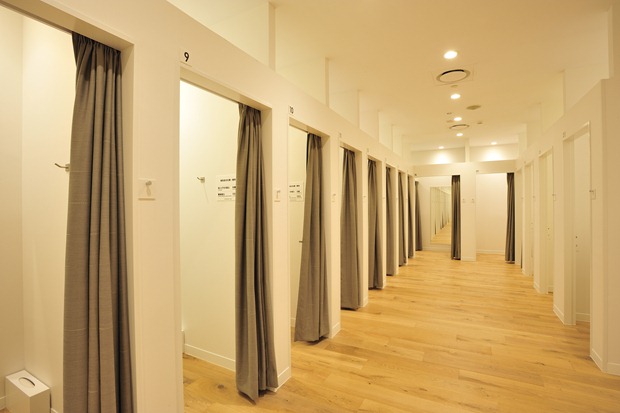 When you buy a new shirt, do you usually try it on first to see if it fits? Or do you purchase it, take it home, try it on, and take it back to exchange because it doesn’t fit (or the color isn’t right or it makes you look like a turnip)? There are many reasons not to try something on: not enough time, just don’t care, the fitting rooms are full, wanting to try it on with something we already have at home. But trying something on ahead of time can definitely save time and prevent us from making mistakes.
When you buy a new shirt, do you usually try it on first to see if it fits? Or do you purchase it, take it home, try it on, and take it back to exchange because it doesn’t fit (or the color isn’t right or it makes you look like a turnip)? There are many reasons not to try something on: not enough time, just don’t care, the fitting rooms are full, wanting to try it on with something we already have at home. But trying something on ahead of time can definitely save time and prevent us from making mistakes.
At Career Services, we try to provide opportunities for our students to “try on” careers ahead of time to see if they fit. Depending on one’s school and year, there are several programs to help students “try on” a career—mentoring programs, externships (job shadowing), practice interviews at Career Services or as part of Mock Interview Day, employers’ programs such as coffee chats or practice interviews, exploration events sponsored by employers or industries, and networking events with professionals and alumni. We encourage you to participate in one of these programs or create this type of opportunity on your own.
Talking with a mentor can provide excellent insight into a particular career path. Several students who have participated in the mentoring program for first-year students in engineering provided comments:
“[My mentor] always replies . . . with deep insights and thoughts. I [have learned] a lot from [my mentor’s] personal experience.” (Bioengineering Student)
“I would recommend this program to other students because it is a great way to connect with a professional. Their opinions and experience go a long way in helping your decision making and career goals.” (Chemical & Biomolecular Engineering Student)
“The program allowed me to explore career paths in more depth and more quickly than I could have hoped for in any other way.” (Electrical Engineering Student)
“There is so much that one can learn from someone who has been through the whole process of going from undergraduate to having a stable career. The interaction is rich with insights. . . . I was very unclear about where I wanted to proceed with my career. Based on my background and interests, my mentor advised me on a lot of issues and was very honest with suggestions for possible career paths.” (Materials Science & Engineering MSE Student)
Wharton undergrads have the opportunity to do an externship, in which they “shadow” their hosts at work for a behind-the-scenes experience.
“I really enjoyed going to the office, experiencing the culture, and meeting the employees. [My host] was great, and I learned a lot about the company.” (Wharton Sophomore)
“My externship went very well. [My host] put me in touch with two buyers, and I learned a lot about the ins and outs of being a buyer.” (Wharton Sophomore)
You can also create these types of opportunities on your own through networking, which is simply “talking to people.” If one of your friends has a relative working in a career field that interests you, ask if you could talk with that person. If you are prepared and ask insightful questions, you could learn a lot about that type of work, and your conversation might lead to a mentoring relationship or a shadowing (externship) opportunity. Don’t be afraid to ask for opportunities to “try on” a career for an hour, a day, or a week!
There are many resources on our website and beyond about career networking, but you might want to start with some of the tips on our blog regarding networking with friends or their family members, networking with alumni and other professionals, networking through LinkedIn or at a career fair. There are posts on the mentoring program for engineering students as well as a student mentee’s experience, and there is a post about coffee chats with employers.
Occasionally there are opportunities for students to attend exploration events in different career fields. For the past three years, Penn students have been invited to attend a media industry event in New York with seasoned professionals. To prepare, one student “asked alumni for tips on how to take advantage of an opportunity like this.” At the event, one student reported, “I asked representatives a variety of questions regarding their personal career path and what they do on a day to day basis. Then I would tell them a little bit about myself and my interests. Eventually I would find a way for them to help me out.” Another student wrote, “I made sure I spoke to at least two people during each break.”
Several students at the media event offered advice to other students about future networking opportunities:
“If there is someone in the room that really makes you nervous, I recommend approaching her/him with a group of three or four. That way you can be part of a conversation that is not entirely directed at you, and everyone can feed off each other. It makes the conversation seem a little more natural as well.”
“Prepare a blurb about yourself that addresses your background and your interests. It might also help to think of a question to ask while the presenter is talking.”
“Just relax and talk to people. No matter what high exec position they have, they are still people.”
“I would recommend reading up on the companies and to make sure you prepare lots of good questions to ask.”
“Prepare yourself before the event. For example, practice saying your pitch about yourself out loud. Once you’re prepared, you won’t be nervous.”
Students not only learn about the industry at such events, but gain professional knowledge to help them in any career path: “I absolutely loved the event. . . . There were many power players from the industry. . . . They all offered wisdom and advice . . . about making oneself invaluable to your company, no matter what industry you’re in.”
So what are you waiting for? Pick out an option and try it on!

